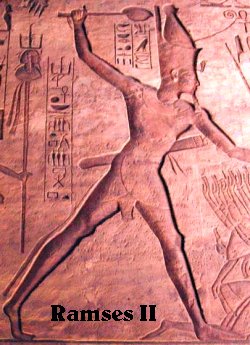The hardening of Pharaoh's heart

- "When Pharaoh saw that the rain, the hail and the thunder had ceased, he sinned yet again and hardened his heart, he and his courtiers. So the heart of Pharaoh was hardened and he did not let the people of Israel go as the Lord had commanded him to do through Moses."
- "Then the Lord said to Moses: 'Go to meet Pharaoh for I have hardened his heart and the heart of his courtiers so that I may show these signs of mine among them, and that you may tell in the hearing of your children and grandchildren how I made fools of the Egyptians."
Exodus 9,34 - 10,2
How to interpret God's hardening the Pharaoh's heart?
This document is part of an online course. If you want to study the rules of understanding Sacred Scripture methodically, join our course
Interpreting Scripture Correctly.
The course is free and offers distinct advantages. |
|
|
1. What does hardening one's heart mean?
Reading the story in Exodus it is clear that the Pharaoh 'hardened his heart' by refusing to give in to God. Hardening one's heart means: we close ourselves against another person.
This is confirmed in other scripture texts:
| |
meaning |
"Is there a poor person among you . . . ? Then do not harden you heart against that person but be open-handed . . ." Deuteronomy 15,7
|
Do not be stingy to that person |
"Harden not your hearts as at Meribab . . . when your ancestors challenged me, tested me . . ." Psalm 95,8 |
Do not rebel against me |
"Why, Yahweh, leave us to stray from your ways so that we harden our hearts against fearing you?" Isaiah 63,17 |
Closing ourselves against God |
Conclusion: Hardening our hearts is obviously something we do ourselves. |
2. But is there no contradiction?
In Exodus 5 - 12, it is often repeated that it was the Pharoah himself who hardened his own heart, as we would expect:
- ".. but when the Pharaoh saw there was a respite, he hardened his heart" (Exodus 8,15)
- "But Pharaoh hardened his heart this time also." (Exodus 8,32)
- "He sinned yet again and hardened his heart" (Exodus 9,34)
But at other times it is stated that God hardened the Pharaoh's heart:
- "But the Lord hardened the heart of Pharaoh and he did not listen". (Exodus 9,12)
- "The Lord said to Moses: ' . . . I have hardened his heart" (Exodus 10,1)
- "But the Lord hardened Pharaoh's heart . . . " (Exodus 10,20)
- "And the Lord hardened the Pharaoh's heart, and he did not let the people of Israel go out of his land." (Exodus 11,10)
For us both cannot be true at the same time. Either the Pharaoh is responsible or God. But, apparently, the biblical author thinks differently.
Since he uses both expressions at the same time, it is clear that the author did not see any contradiction between them. Somehow the author affirms that it is both the Pharaoh's own fault and that, at the same time, God is involved. How can that be?
|
3. Peculiarity of Hebrew thinking
The book of Exodus, like most of the Old Testament, was written in Hebrew. Remember that a person's language defines to a great extent how that person thinks.
Hebrew verbs allow for internal modifications. One of the verbal modifications is a causal form, known as the hiphil-form. The root 'qadash' (to be holy) can be modified to 'hiqdish' which means 'to make holy'. The root 'muth' (to be dead) can be transformed to 'hemit' to express: 'to make dead'. And so on. And that is not all.
This hiphil verbal form may express both "CAUSING someone to do something" or "ALLOWING someone to do something". Let us see some examples.
The hiphil form hemit = causing to die
"Joshua struck [the five kings] and caused them to die. He had them hanged on five trees." Joshua 10,26 |
Joshua killed them |
"Saul took his sword and fell on it . . . Saul died because he had not shown himself faithful to Yahweh: he had not kept the word of Yahweh . . . who caused him to die. He transferred the monarchy to David." 1 Chronicles 10,1-14 |
God allowed Saul to die |
The root °abar means: 'to cross'. Its hiphil modification - he°ebir - means making someone go across.
"Lord God, why have you made this people cross the Jordan ...?" Joshua 7,7 |
made this people cross the Jordan |
"They said;.. .Do not make us cross the Jordan." Numbers 32,5 |
do not force us to cross |
"Make these stones . . . cross (the Jordan)." Joshua 4,3 |
carry these stones across |
"But Sihon would not make us cross (through his land)." Deuteronomy 2,30 |
he would not allow us to cross |
The same verbal form expresses the physical act of carrying across, forcing people to go to the other side or merely permitting them to cross.
From such examples we can learn that the Jews did not clearly distinguish between 'causing to' and 'allowing to'. Since they express both by same form, the two shades of meaning are not much different to them.
This throws much light on scriptural texts that describe God's influence on human action! When the story in Exodus presents God as 'hardening' (hiphil: hikbid) the heart of Pharaoh, it simply will not do to draw from it conclusions regarding predestination. The sacred author makes quite clear elsewhere that the Pharaoh himself is responsible for his obstinacy. God, of course, uses this obstinacy in his providence and so the author simply attributes the ultimate hardening to God without further expressing clearly between whether God forced Pharaoh to sin or permitted him to do it.
The very absence of this distinction in language may puzzle us, but it has to be recognized as a fact flowing from Hebrew.
Then how do we know the intended meaning of a passage?
We certainly cannot know the intended meaning from simply looking up a dictionary.
The only way to understand the meaning correctly is to look at the context of the whole passage. See all the examples given above.
From the context in the Exodus story it is clear that God allowed the Pharaoh to harden his heart. |
Does this also apply to Romans 9,1-32?
Indeed, it does.
Romans 9,1-32 is another passage misunderstood by Calvin and his followers. They believed that in it Paul was speaking about predestination to heaven or hell. By misreading the text they believed that God fixed a person's ultimate destiny in heaven or hell without any regard to good or evil done by that person. This view is known as antecedent predestination = predestination before personal virtue or guilt.
The context of Romans 9,1-32, however is totally different. Paul preached that also non-Jews (Gentiles) were chosen by God for salvation in Jesus Christ.
"Is God the God of Jews only? Is he not the God of Gentiles also? Yes, of Gentiles also, since God is one. He will justify the circumcised on the ground of their faith and the uncircumcised through their faith." Romans 3,29-30
 The Jews of his time objected that, The Jews of his time objected that,
(a) if that were the case, God had failed in his promise to Israel. For they were the chosen people.
(b) That since the Jews had by and large rejected Jesus, they would then not be saved and so God's promised had failed.
Paul responded to say that, yes, the Jews had been the chosen people (Romans 9,1-5), but that God had now widened the election to include the Gentiles. Because God is totally in charge of election. He can choose whom he wills, also the Gentiles.
In Romans 9,6-24 Paul shows God's freedom to elect. Remember that election means: being invited to receive God's mercy. We can show this in some details of Paul's argument.
| |
God's way of electing |
9,6-13. Paul describes how, among the patriarchs, did not choose by simple bodily descent. He often chose the younger like Isaac and Jacob. "Jacob I loved, Esau I hated." |
In spite of the strong expressions used, this is not about assigning someone to heaven or hell. Simply that God can choose whom he will. The chosen people were children of Jacob. In Hebrew, hate does not mean hate in our sense. The favourite wife was the 'loved' wife; the less favourite the 'hated' wife (Deuteronomy 21,15-17) |
9,14-18. Paul cites the example of the Hebrews in Egypt. God had mercy on the Jewish but he rejected the Pharaoh. "He has mercy on whomsoever he wills, and hardens the heart of whomever he wills." |
Again in Egypt God chose the underdogs, not the Pharaoh's race. He allowed the Pharaoh to harden his heart but helped to Jewish people escape and he offered them his covenant - a pure act of mercy. |
9,19-24. Paul then quotes the image of the potter used by Isaiah and Jeremiah. "What if God, prepared to show his anger and power, has endured with much patience the pots that deserve anger heading for destruction, in order to manifest the abundance of his goodness to the pots who receive mercy . . .?"
|
Note that the whole point of the image of the potter includes the 'free will' of the pots. If a pot rebels against the potter, will the potter fail? No, he can then decide to use the pot for a menial purpose. Read Jeremiah 18,1-12! Paul is saying that God has patiently endured the unfaithfulness of the Jews for many centuries by not punishing them but now he extends the election to non-Jews to whom he wants to be merciful. |
"God renders to every person according to that person's deeds, to those who do good ... eternal life, to those who do not ... punishment." Romans 2,6-11 |
Remember. Paul always taught that God rewards people for what they have done. Heaven or hell are not decided by antecedent predestination. God treats Gentiles as he treats Jews. 'God shows no partiality'. |
The teaching of Romans 9,1-32 cannot be correctly understood through a literalistic interpretation of the words. Such an interpretation clearly misleads. The meaning Paul intended, which carries the inspired message, can only be known by studying the context of what Paul is saying.
© John Wijngaards
|









